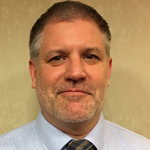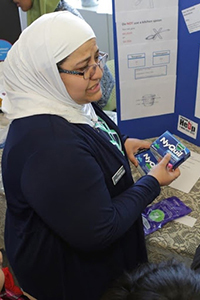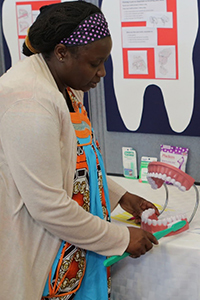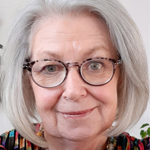City of Anchorage gives weekly COVID updates in 19 languages
By PATRICIA CORRIGAN
"Hunker down." That's the message many medical centers and municipalities are broadcasting throughout the U.S. during the COVID-19 pandemic. But how is that message received in communities that have no comparable phrase in their native languages?
A dozen peer leader navigators, part of a multicultural, multilingual health education and outreach initiative in Anchorage, Alaska, have solved that problem, advising individuals they serve to simply "stay home." The navigators also provide detailed information on handwashing, disinfecting surfaces and wearing masks. Providence Health & Services Alaska has financially supported the program since it began about eight years ago.

Johnson
"The peer leader navigator program is tremendous," said Nathan D. Johnson, regional director, community health investment for Providence St. Joseph Health – Alaska Region. "Immigrants may have trust issues as well as cultural and language barriers, and presenting information in different languages in a culturally appropriate way is an exquisite example of where health care needs to go."
This year, Providence's community benefit funds provided the navigator program with $80,000 for two years plus funds for nurse oversight of content development. "The mission of Providence serves the poor and vulnerable," Johnson noted, "but we have an increasing desire to address social determinants of health in order to get ahead of the curve and move into a prevention space, so we desire that the peer leader navigator program would continue."
More than 100 languages are spoken in the city of Anchorage, including Alaskan native languages, Spanish, Thai, Korean, Chinese, Hmong, Russian and numerous African dialects. Some 800 adults and families that speak about half of those 100 languages are served each year by the Alaska Literacy Program, which helps coordinate The Anchorage Health Literacy Collaborative. The latter partnership is made up of private, public and nonprofit organizations, including Providence Alaska Medical Center and its Faith Community Nursing Program.

Fadwa Edais, a peer leader navigator who is from Jordan and speaks Arabic, promotes safe medication disposal and has distributed over 200 disposal bags provided by the State of Alaska.
Founded in 2007 to improve health care for low-literacy, underserved populations in Anchorage, The Anchorage Health Literacy Collaborative started the peer leader navigator program. It was coordinated by Linda Shepard, a Providence nurse who is now retired. The peer leader navigators provide information on access to health care, mental health care and disaster preparedness.
The cadre of health promoters were originally called peer language navigators and they were deployed in their own immigrant or native communities as knowledgeable, trusted resources. But as Shepard explains in a June 2019 story on the Providence Health & Services website, the health challenges for immigrants didn't have that much to do with language. "It has much more to do with the experience of migrating to the United States. So, we changed the name to peer leader navigator instead of peer language navigator.
"That lived experience of coming into a country is what really connects them," she added.

An immigrant practices teeth brushing techniques she is learning in an oral care class taught by a peer leader navigator in Anchorage, Alaska.
Marisol Vargas, program manager at the Alaska Literacy Program, has volunteered as a peer leader navigator for eight years, working with Spanish-speaking individuals. "We have lost personal contact during the pandemic, with no face-to-face meetings, but we continue to help communities receive important information," she said. The navigators also are working with city government leaders, who have posted videos, posters and news reports about COVID-19 in numerous languages on the city's website and on social media.
"We're working with the municipality to help show people how to wash their hands and sanitize their homes, how to stay safe," Vargas said. It was Vargas who first pondered the term "hunker down" on the city's website. She didn't know the phrase, and wondered how she could help other Spanish-speaking individuals understand it.
"Now I know it means stay at home, don't go outside," she said. "Language matters, but in languages other than English, it's not always just the message — it's how it's delivered." That's why peer leader navigators are staying in contact with people by phone as well, trying to support them and sharing information with them from other institutions.
Some navigators are translators or language interpreters; others work with those specialists to hone pertinent messages. The navigators receive small stipends for staffing special public health events and outreach activities, but otherwise the work is done on a voluntary basis. "This isn't really a job — it's a passion," Vargas said. "The peer leader navigators do this work because they like to do it. My reward is when a person smiles and says they understand, or says 'thank you.'"

Smith
Immigrants value the navigators, but they aren't the only fans. "Providence values them, as does the municipality — they were invited on Anchorage's language-access task force," said Pauline "Polly" Smith, executive director of Alaska Literacy Program. "The head of that task force has said the information the peer leader navigators are providing about what needs to be done, how best to do it and what the needs are is driving policy."
And now, Smith said, the navigators have blossomed into a new field — video production. For people who are not necessarily literate in their own languages, the navigators are creating videos to help individuals better cope with the challenges of reducing contagion risks and social distancing. Some of the videos have been posted on the municipality's website, where the information can reach far more people than one-on-one contacts.
"Before, the expertise of the peer leader navigators was recognized as an important resource," Smith said. "Now, it is critical, a matter of life or death."